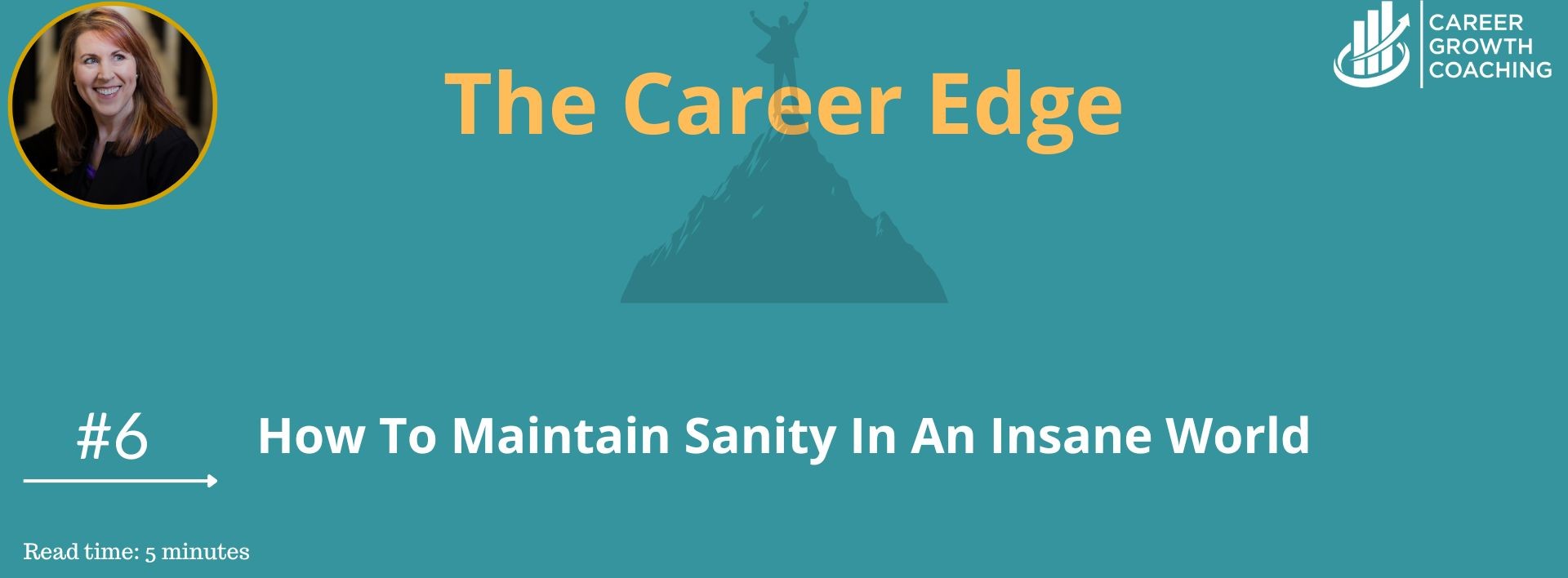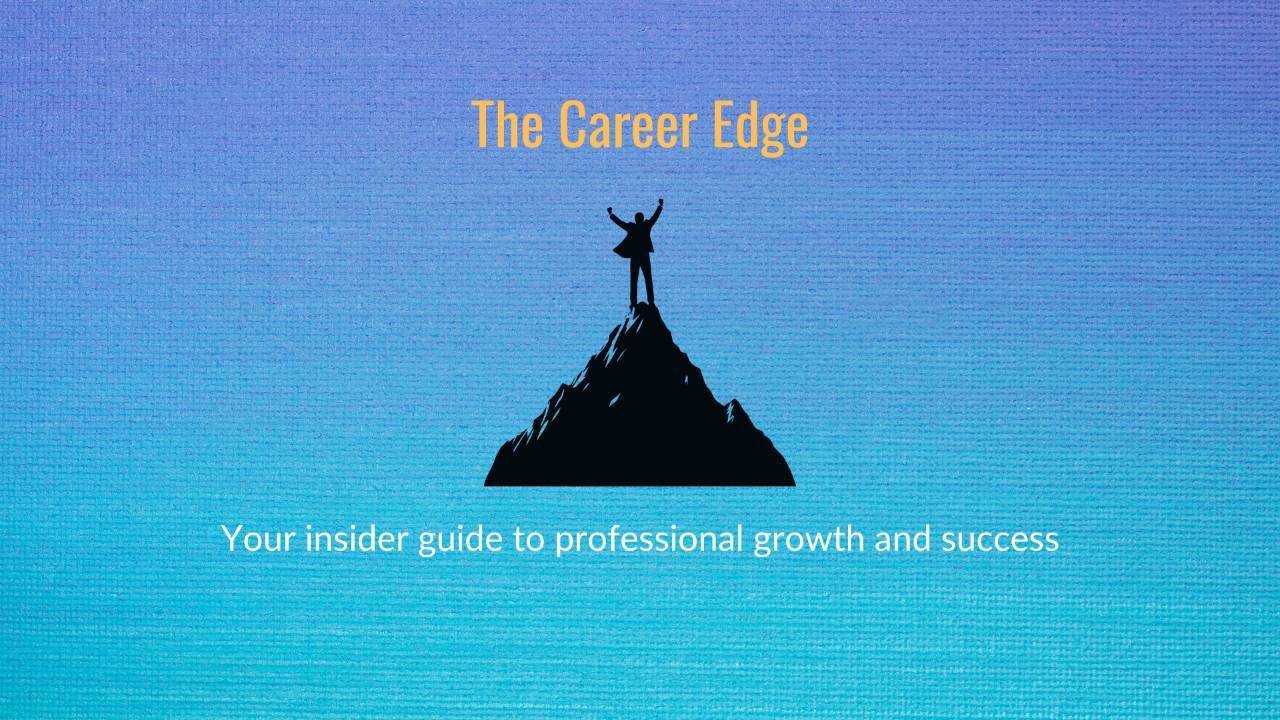How to Maintain Sanity In An Insane World

Here’s a cathartic exercise for you:
Grab a pen and paper, think about the last month, and write down everything that frustrated, annoyed or angered you.
These frustrations can run the gamut from a colleague who no showed for a meeting, your surly teenager, the birthday gift that never arrived, getting fired or the recent downward spiral of the stock market.
Let it rip.

Record anything you want to complain about.
This is your no-judgement opportunity to vent about every crazy-making thing your boss, co-workers, family, friends, politicians or random people on the street have done recently.
Did you run out of paper?
The Root Of Frustration

Now take a look at your list.
“If only my manager had done things the “right” way…”
“If only the tech job market wasn’t so horrendous...”
"If only my kid/partner/sibling would behave better..."
Or, mine from rainy Seattle today...
"This weather sucks. I want to move to Arizona."
Do you notice how each complaint involves a conflict between what should have happened and what actually happened?
We expect that the world, the workplace, our lives will operate a certain way. The way we want it to, aka the way it should be.
And when it does not, we are disappointed, thrown, or feel victimized.
Why should you care?
As you grow in leadership, you're making higher stake decisions. You're responsible for more careers than just your own. You're making choices that have bigger impact - and bigger consequences.
People are watching and how you show up matters.
Since there's a limited amount of time and mental energy in a day, it’s important to know:
1) what to let go of
2) what to accept, or
3) what to act on
Your ability to stay calm in the midst of insanity that exists in the workplace and in life is a skill worth mastering.
The Concept Of Two Worlds

We all have a picture of how the world “should” work – how the boss should behave, how our companies should treat us, the proper actions coworkers should take, the right way to drive, the right way to load the dishwasher....
...complete the sentence with your list of grievances.
When the world matches our picture, life is good and all is well. When it doesn't, the world is wrong we react, complain, blame or sometimes shame.
I call this the concept of two worlds.
One is the world of expectation, the ideal world of how things “should” be. The other is the world of reality, and what people do and say in real life.
World of Expectation: People should reply back to networking DMs or emails, especially if you know them.
World of Reality: You've been ghosted by that person who was your teammate for two years, despite two friendly follow ups.
The ability to hold both these worlds in your head simultaneously is a skill worth developing.
Here's why:
Take a pause and acknowledge the reaction you have when your expectations are not met or when things don't go the way you thought they should (tip: ignoring, denying or suppressing how you feel is unhelpful here).
No judgment - write a couple of them down.
Let's face it. We're human. And if things don't go as expected, that can feel like a threat. The issue isn't the emotion itself; we are emotional beings not robots. The issue is that we react because, in that moment, we don't think there's anything we can do.
Getting stuck in the world of expectations or “shoulds” doesn’t allow you to deal with reality; it just limits your ability to act.
It makes sense that we would react when we feel powerless or stuck.
But when we have a deathgrip on the world of expectation it blocks us from realizing the choice (or choices) we actually do have.
A recent article in Psychology Today highlights the danger of living in the expectations.
It explains that while high expectations can motivate us, they can also lead to burnout, dissatisfaction and reaction when reality doesn’t align.
There's another gotcha when it comes to these two worlds:
Typically YOU (and those your work or live with) are paying the price of all the reactive emotion.
Here's what I mean using all the examples from above...
- Is your manager losing sleep since they hijacked the team meeting from last week?
- Does the tech job market have any concern that it's hot or cold?
- Do you think your kid/partner/sibling is worrying that they should've behaved differently?
- As I think about it, it's comical to think that Seattle weather would care whether I like it or not.
The answers above, are nope, likely not.
With only 1440 minutes in a day, how many of them do you want to spend fuming?
Learning the skill of managing expectations is crucial for you, your mental well-being, your reputation and credibilty and to the families and teams who experience your emotional spillover.
How To Find (More) Peace

The conflict between how we believe things “should” be and how they actually are often triggers a negative emotional response in us, and the greater our emotional investment, the greater our reaction to that conflict, in the form of sadness, fear, guilt, or even downright hostility.
So how can you break this cycle?
Realize that you have a choice:
Making choices brings you into a place of control and autonomy. You're an active participant rather than a passive observer.
You're coming from a place of personal power versus victimhood.
You can discern which choices you do have, including aligning with your values, needs and goals. Even under difficult circumstances, like a layoff, you may not be able to have control over your employment status, but you can choose how to respond or process the situation and how much emotional energy you want to expend.
Here are three choices you always have:
1. Stay Stuck in “Should”
You can stay in the space you're attached to being right or where things are not as they should be -- and get stuck in all the emotions that brings. There may be a cost you're paying, but realize it is a choice to stay in the world of expectations. It's totally fine to find a healthy way to blow off some steam, and then move on to #2 or #3. Just don't get stuck here.
2. Breathe, Accept and Move Forward
You can acknowledge the emotions, accept them as part of who you are and how you react when something is “not right,” and move on. My weather example is a perfect one here. My family chooses to live in Seattle. We have an average 39.34 inches of rain here annually. I can bitch and moan about this, or take a breath, spend some time in a hot sauna and remember that the gorgeous July - September is the tradeoff I'm okay with.
3. Take Action or Speak Up
There are times when reality is highly aggravating. And accepting what is doesn't sit right. Let's take the manager who hijacked the last team meeting. You remember you have a choice: 1) you can vent and commiserate with coworkers about what an awful meeting it was, 2) you can accept the fact that your manager is the way s/he is, or 3) you can choose to speak up and raise this concern to his/her attention so that it doesn't happen again. Tip: remember to focus on the outcome you want, not the problem that occurred. This keeps you in a place of empowerment versus resentment and will make the conversation much more productive.
The skill is building distinction between the two worlds. You can live in the frustration of unmet expectations or accept the reality of what is, make the best choice in the circumstances, and create your own destiny.
The Bottom Line
Here are 3 Steps to find peace in the world of reality:
-
Acknowledge the Gap:
Recognize when you’re stuck in the world of expectation. Are you frustrated because things didn’t go as planned? Identify the expectation and the reality. -
Accept What You Can’t Control:
There’s power in letting go. You can’t control how others act or unexpected obstacles, but you can control your response. Focus on what you can influence. -
Take Action, Not Frustration:
Shift your mindset from "why me?" to "what’s next?" Or my personal favorite "how is this happening for me versus to me?" Ask yourself, How can I move forward given the reality of the situation?
The Weekly Edge
One of my favorite questions is
“What can you let go of”?
True leadership transformation comes not by adding more skills, to-dos, accomplishments, certifications or experience to our plate, but by removing what does not belong there to begin with.
Being attached or stuck in how things should be or should have been - and the resulting reaction - is a good example of something to let go of.
When you let go of expectations, you open yourself up to creative solutions. Accepting reality doesn’t mean settling—it means freeing yourself to make the best of what is rather than being frustrated by what isn’t.
You can grieve for the ideal that didn’t happen – or you can relax with what is and create your own sanity.
The world of reality is where growth, resilience, and true success happen. Embrace it.
You’ve got this.
Julie
Want To Work With Us?
1. Want to Stand Out On LinkedIn, Overcome Imposter Syndrome, get a personalized Leadership Impact Scorecard, or attend a live masterclass on Eliminating Blind Spots? Check out our new Resources page for free training and tips to help you get ahead.
2. Realizing it’s time for a Resume Revamp or LinkedIn Rewrite? Contact us for information about saving time and getting yourself a lasting career asset (or two) that will help you differentiate yourself, stand out from the competition, and yes, that you’ll be proud of for years to come. Yes, AI can write you a resume. But beware of getting flagged or thrown out of the application process. You’re much better off investing in an asset you know is branded, quantified and aligned to the perfect job you’re seeking
3. Ready to get the Expert Coaching Guidance to collapse your job search timeline or become highly impactful in your organization? Want to be that force multiplier for your team, stakeholders and clients? These are just a few examples of what working with us 1:1 can do for you, your leadership and your career. Set up a time to chat with us and see if it’s a fit.






Responses